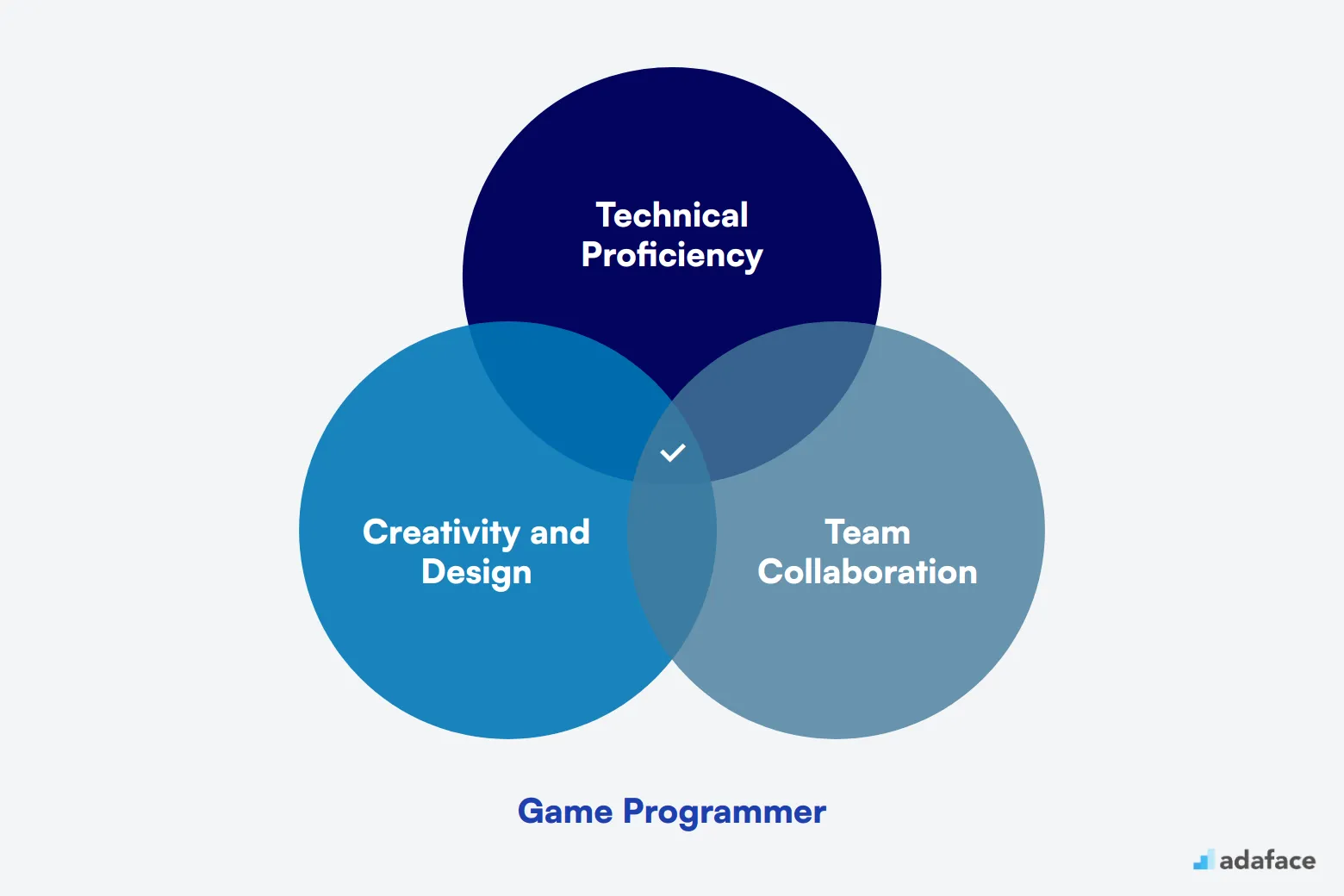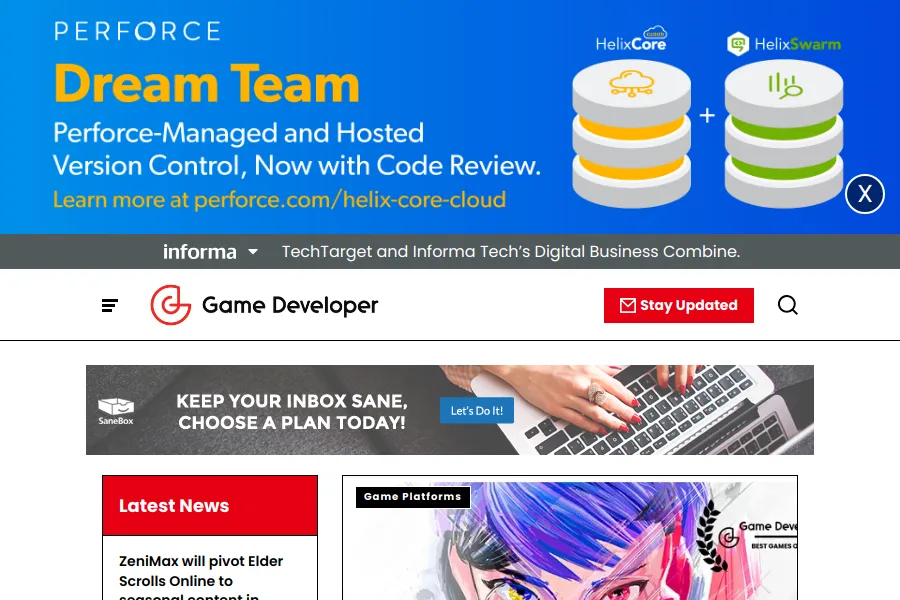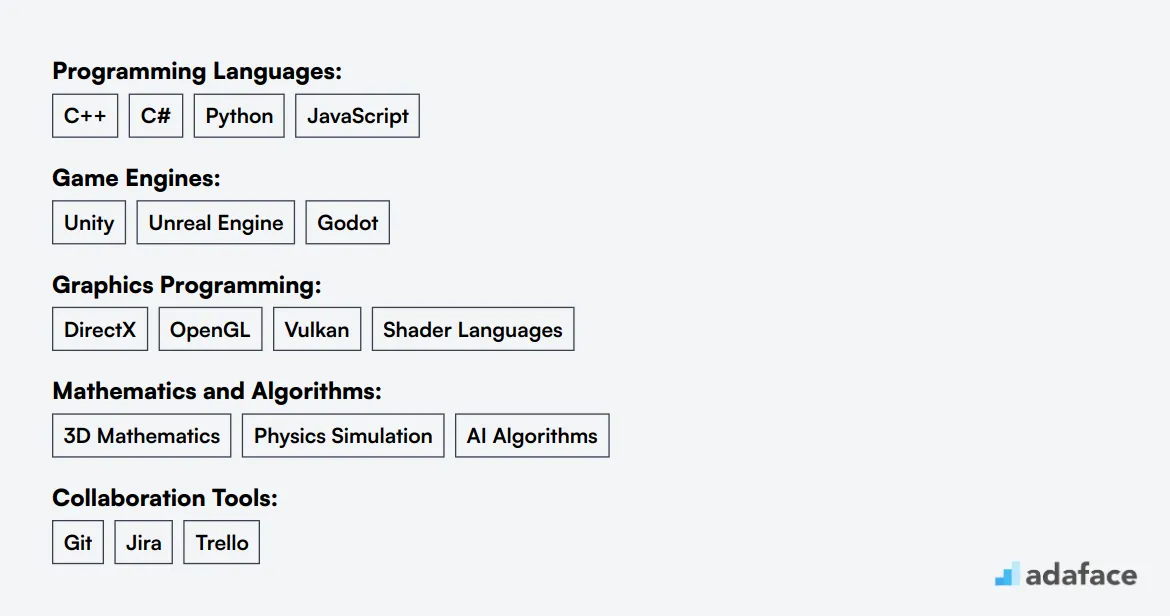In the competitive world of game development, hiring the right game programmer can make all the difference. A seasoned recruiter knows that finding a candidate with the right blend of creativity, technical expertise, and problem-solving skills is challenging. Companies often underestimate the unique demands of this role, overlooking critical skills such as proficiency in game engines or the ability to translate game design into functional code.
This article will guide you through the intricacies of hiring a game programmer. We'll cover everything from crafting a compelling job description to conducting effective interviews. Discover how to leverage platforms like Adaface to assess candidates' skills and make informed hiring decisions. Visit our job description resources for more insights.
Table of contents
Why Hire a Game Programmer?
Game programmers are key to bringing video game concepts to life. They develop the core functionality, mechanics, and systems that power games. If your company is venturing into game development or expanding its existing portfolio, a skilled game programmer can turn creative ideas into playable realities.
Consider hiring a game programmer when:
- You have a game concept but lack technical expertise to implement it
- Your current team needs specialized programming skills for game engines or graphics
- You're scaling up game production and need dedicated coding talent
Before committing to a full-time hire, assess your project scope and timeline. For smaller or short-term projects, working with a freelance game developer might be more cost-effective. For ongoing development or multiple game projects, bringing a permanent game programmer on board can provide consistent expertise and help build your company's technical capabilities.

What do Game Programmers do?
Game programmers are the brains behind the code that brings video games to life. They work on creating the software that defines the rules and gameplay mechanics, ensuring that the virtual world behaves as expected when players interact with it.
Day-to-day tasks of a game programmer include:
- Writing, testing, and debugging code to ensure seamless gameplay.
- Collaborating with game designers to implement game mechanics and features.
- Optimizing game performance by refining code and incorporating feedback.
- Working with other developers to integrate graphics, audio, and network components.
For more insights on the required skills, you can explore our skills required for game programmer guide.
Key Skills and Qualifications for Hiring a Game Programmer
Hiring a game programmer can be tricky, as the right candidate for your project may not fit the conventional mold. Understanding the difference between what's required and what's preferred is essential to avoid missing out on talented individuals. To help you create an ideal candidate profile, we’ve outlined the key skills and qualifications to consider.
Required skills generally include a Bachelor's degree in Computer Science or a related field, proficiency in programming languages like C++, C#, or Python, and experience with game development frameworks such as Unity or Unreal Engine. Additionally, a strong understanding of 3D mathematics and the ability to work collaboratively in a team are critical.
Preferred qualifications can enhance your candidate pool. Experience in mobile game development, knowledge of AI programming, familiarity with graphics APIs like DirectX or OpenGL, and expertise in multiplayer game programming are all valuable assets. Understanding version control systems like Git also helps streamline the development process.
| Required skills and qualifications | Preferred skills and qualifications |
|---|---|
| Bachelor's degree in Computer Science, Software Engineering, or related field | Experience with mobile game development |
| Proficiency in programming languages such as C++, C#, or Python | Knowledge of AI programming and machine learning |
| Experience with game development frameworks like Unity or Unreal Engine | Familiarity with graphics APIs like DirectX or OpenGL |
| Strong understanding of 3D mathematics and algorithms | Experience in multiplayer game programming |
| Ability to work collaboratively in a team environment | Understanding of version control systems like Git |
How to write a Game Programmer job description?
Crafting a compelling Game Programmer job description is key to attracting the right talent for your team. Once you have a candidate profile in mind, the next step is capturing that information effectively in the job description.
- Highlight key responsibilities and impact: Clearly outline the specific tasks the game programmer will handle, such as developing gameplay mechanics or optimizing performance. It's important to communicate how their contributions will enhance the final product and influence the gaming experience.
- Balance technical requirements with creative skills: Include necessary technical skills like proficiency in C++ or Unity, but also emphasize the need for creativity and innovation, which are important in game development. A well-rounded description attracts candidates who excel in both technical and creative aspects.
- Showcase your company's unique selling points: Mention exciting projects, a collaborative culture, or opportunities for professional development. These elements can make your company stand out. For more details, refer to our game programmer job description.
10 Platforms to Hire Game Programmers
Now that you have a detailed job description ready, the next step is to list it on various job platforms to attract potential candidates. This will help you reach a wide range of game programmers, from freelancers to those seeking full-time positions.
Gamasutra Job Board
Ideal for finding full-time game programming positions across various companies. Gamasutra is a respected industry resource, attracting postings from established studios and publishers.

GamesIndustry.biz Jobs
Excellent for full-time positions in game development, including programming roles. Offers a wide range of job listings from various game companies and studios.

Indeed Game Programmer Jobs
A general job board with a good selection of game programming positions. Useful for finding both entry-level and experienced roles across different game development companies.

The remaining platforms offer diverse options for hiring game programmers. LinkedIn is great for leveraging professional networks, while Upwork and Fiverr cater to freelance needs. Dice is tech-focused, ideal for finding skilled candidates, and Remote Game Jobs specializes in remote opportunities. Y Combinator Jobs is perfect for startups seeking innovative talent, and the IGDA Career Center attracts candidates active in the game development community. For more insights on making the right hire, explore our technical recruitment blog.
Keywords to Look for in Game Programmer Resumes
Resume screening helps you quickly filter through numerous applications for game programmer positions. It's a time-saving step that lets you focus on the most promising candidates.

When scanning resumes, look for key technical skills like C++, C#, or Python proficiency. Keep an eye out for experience with game development frameworks like Unity or Unreal Engine, and knowledge of 3D mathematics and algorithms.
To streamline the process, consider using AI tools like ChatGPT or Claude. These can help you quickly identify resumes that match your criteria, saving time in your hiring process.
Here's a sample prompt for AI resume screening:
TASK: Screen resumes for game programmer role
INPUT: Resumes
OUTPUT:
- Candidate name
- Matching keywords
- Score (out of 10)
- Shortlist recommendation
KEYWORDS:
- Programming: C++, C#, Python
- Game Engines: Unity, Unreal Engine
- Graphics: DirectX, OpenGL
- Math: 3D mathematics, physics simulation
- Collaboration: Git, Jira
Recommended Skills Tests to Screen Game Programmers
When hiring game programmers, skills tests are valuable to ensure candidates possess the technical prowess necessary for game development. These tests help identify the right fit by evaluating their knowledge and application skills in specific areas.
Unity Test: Game development often involves working with game engines. The Unity Test checks candidates' proficiency in using the Unity engine, a popular tool in creating both 2D and 3D games.
C# Skills Test: Many game engines, including Unity, utilize C# for scripting. The C# Online Test helps determine the candidate's ability to implement gameplay mechanics efficiently.
JavaScript Online Test: Some game development scenarios might require JavaScript, particularly for web-based games. This test assesses their capability to handle JavaScript effectively in game programming contexts.
Python Online Test: Python is also used in game development for various tasks, including scripting and automation. The Python Online Test evaluates the candidates' ability to apply Python skills in game-related tasks.
Algorithmic Skills Test: Game development requires strong problem-solving skills. The Programming Tests include algorithmic challenges that test candidates' ability to tackle complex challenges during game development.
Recommended Case Study Assignments for Hiring Game Programmers
Case study assignments can be effective for evaluating game programmer skills, but they come with drawbacks. They're often time-consuming, which can lead to lower completion rates and potentially losing qualified candidates. Despite these challenges, well-designed case studies can provide valuable insights into a candidate's abilities.
Game Engine Prototype: This assignment tasks candidates with creating a basic game engine prototype. It tests their understanding of core game development concepts and ability to implement fundamental systems. This exercise is particularly useful for assessing a candidate's skills required for game programming.
AI Behavior Implementation: Candidates are asked to develop an AI system for game characters. This assignment evaluates their ability to create intelligent behaviors and optimize performance. It's an excellent way to gauge problem-solving skills and familiarity with game AI concepts.
Physics Simulation: This case study involves implementing a simple physics system for a game scenario. It tests the candidate's understanding of math and physics principles in game development. This assignment is particularly relevant for roles that involve a lot of physics-based gameplay elements.
Structuring Technical Interviews for Game Programmer Candidates
After candidates pass the initial skills tests, it's time for technical interviews to assess their hard skills in depth. While skills tests help filter out unfit candidates, technical interviews are key to identifying the best talent for your game programming role. Let's look at some sample interview questions to help you evaluate candidates effectively.
Consider asking: 1) 'Explain the game loop and its importance in game development.' 2) 'How would you optimize a game's performance?' 3) 'Describe your experience with physics engines in games.' 4) 'How do you approach debugging in game development?' 5) 'What's your process for implementing new features in an existing game?' These questions help assess the candidate's technical knowledge, problem-solving skills, and practical experience in game programming.
What's the difference between a Gameplay Programmer and an Engine Programmer?
Gameplay programmers and engine programmers often seem similar, especially to those new to game development. However, their roles focus on different aspects of the gaming world which can lead to some confusion. Recognizing these differences is important for hiring the right talent to meet your project needs.
A gameplay programmer primarily works on game mechanics and features, using languages like C++, Python, and Lua. They focus on elements such as AI, UI, and game physics. Their work environment typically involves developing in-game features using tools like Unity or Unreal Engine. Gameplay programmers often pursue career paths in gameplay design or as game directors, usually employed by game development studios.
In contrast, an engine programmer is responsible for the architecture of the game engine itself. They use programming languages like C++, C#, and Assembly to work on rendering and optimization tasks. Their work centers around engine development and maintenance, typically using proprietary game engines. Engine programmers typically have educational backgrounds in computer science or software engineering and often work for game engine companies, progressing to roles in technical leadership or as CTOs.
Understanding these distinctions is important for recruiters to accurately match candidates to the right roles. For more on the skills required for a game programmer, you can read more here.
| Gameplay Programmer | Engine Programmer | |
|---|---|---|
| Primary Focus | Game mechanics and features | Game engine architecture |
| Programming Languages | C++, Python, Lua | C++, C#, Assembly |
| Key Skills | AI, UI, Game Physics | Rendering, Optimization |
| Work Environment | In-game feature development | Engine development and maintenance |
| Educational Background | Computer Science or Game Design | Computer Science or Software Engineering |
| Typical Employers | Game Development Studios | Game Engine Companies |
| Career Path | Gameplay Design, Game Director | Technical Leadership, CTO |
| Tools Used | Unity, Unreal Engine | Proprietary Game Engines |
What are the ranks of Game Programmers?
The hierarchy within the game programming field can sometimes be confusing due to the overlapping skills and responsibilities among ranks. Yet, understanding these ranks can help in establishing a clear path for hiring and career progression.
- Junior Game Programmer: Often an entry-level position, junior game programmers assist in the development of game elements under the guidance of senior team members. They work on small projects or parts of a larger project, allowing them to hone their coding and problem-solving skills.
- Game Programmer: This is a mid-level role where individuals are expected to develop more complex game mechanics and systems. Game programmers often collaborate with designers and artists to bring the game’s vision to life, ensuring that the gameplay is engaging and seamless.
- Senior Game Programmer: A senior game programmer is responsible for leading projects and mentoring junior programmers. They have a deep understanding of game development processes and can effectively troubleshoot and optimize code. Their experience allows them to take on more strategic roles in the project lifecycle.
- Lead Game Programmer: This position involves overseeing the programming team and ensuring that all technical aspects of the game align with the project’s objectives. Lead game programmers coordinate with other departments and manage the project's schedule and resources. For a detailed look into what the role might entail, you can refer to this game programmer job description.
- Technical Director: At the top of the programming hierarchy, technical directors focus on the big picture, setting the technical vision and strategy for game development. They evaluate new technologies and ensure that the team has the tools needed to succeed. Their role is crucial in shaping the technical path of current and future projects.
Hire Top-Notch Game Programmers
In this guide, we've covered the key aspects of hiring game programmers, from understanding their role to crafting effective job descriptions. We've explored essential skills, qualifications, and the best platforms to find talent. We've also discussed how to screen candidates using resume keywords, skills tests, and technical interviews.
The key takeaway is to use precise job descriptions and relevant skills assessments to ensure accurate hiring. Consider using a Unity test or other programming tests to evaluate candidates' technical abilities. By following these steps, you'll be well-equipped to build a strong game development team.
JavaScript Online Test
FAQs
Key skills for game programmers include proficiency in programming languages like C++ or C#, experience with game engines like Unity or Unreal Engine, strong problem-solving abilities, and understanding of graphics and physics.
A technical interview for a game programmer should assess their coding skills, problem-solving capabilities, and familiarity with game development tools. Include practical coding tests and scenario-based questions to evaluate their expertise.
Qualified game programmers can be found on platforms such as LinkedIn, Stack Overflow, game development forums, and specialized hiring platforms like Adaface.
Gameplay programmers focus on implementing game design elements like mechanics and controls. Engine programmers work on the core software that powers the game, optimizing performance and functionality.
Look for specific keywords related to game development, such as experience with game engines, AI programming, and multiplayer systems. Pay attention to past projects and roles that demonstrate their expertise and problem-solving skills.
Recommended skills tests include coding assessments for languages like C++ or C#, and tasks that involve game engine manipulation or algorithm problem-solving. Platforms like Adaface offer tailored tests for game programmers.

40 min skill tests.
No trick questions.
Accurate shortlisting.
We make it easy for you to find the best candidates in your pipeline with a 40 min skills test.
Try for freeRelated posts
Free resources



